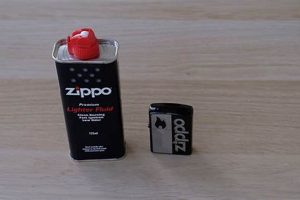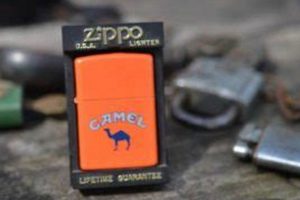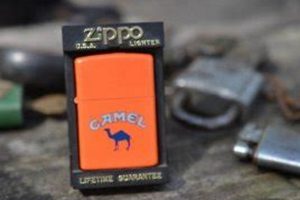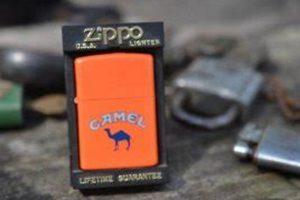The manufacturing location of a Zippo lighter is a key aspect of its brand identity and perceived quality. Authentic Zippo windproof lighters are primarily produced in Bradford, Pennsylvania, USA, the company’s sole manufacturing facility. This commitment to a single location allows for close quality control and contributes to the product’s reputation for reliability and craftsmanship.
Maintaining production within the United States has allowed Zippo to cultivate a strong association with American manufacturing heritage. This focus on domestic production has not only provided jobs but has also allowed the company to maintain a close connection with its supply chain and ensure adherence to its high standards. The company’s history is closely tied to this location, having been founded and operated there since 1932. This long-standing presence in Bradford underscores the significance of place in the company’s narrative.
Understanding the geographic origin of these lighters provides valuable context for appreciating the brand’s history, its commitment to quality, and its enduring appeal. This knowledge can further inform discussions about manufacturing practices, brand loyalty, and the cultural impact of iconic products.
Tips for Authenticating a Zippo Lighter
Given the popularity and collectability of Zippo lighters, verifying authenticity is crucial. Counterfeit lighters are common, and understanding key production details can help differentiate genuine Zippos from imitations.
Tip 1: Examine the Bottom Stamp. Authentic Zippo lighters feature a bottom stamp indicating the date of manufacture and location. Familiarize yourself with the evolving stamp styles used throughout Zippo’s history. This stamp is a primary indicator of authenticity.
Tip 2: Inspect the Insert. The insert, the removable internal mechanism, should be marked with “Zippo” and feature consistent construction and markings. Compare the insert’s details with those of known authentic examples.
Tip 3: Feel the Weight and Quality. Genuine Zippo lighters have a distinct heft and solid construction. Counterfeits often feel lighter and less robust.
Tip 4: Listen to the Click. The distinctive “click” of a Zippo lighter is another indicator of authenticity. Counterfeit lighters may have a duller or less precise click.
Tip 5: Verify the Packaging. Authentic Zippo lighters come in distinctive packaging. Examine the box and any included paperwork for consistency with official Zippo branding and materials.
Tip 6: Research Authorized Retailers. Purchase from reputable sources and authorized Zippo retailers to minimize the risk of acquiring a counterfeit product.
By understanding these key indicators, consumers can make informed decisions and ensure they are purchasing genuine Zippo products. These authentication tips contribute to preserving the value and legacy of the brand.
Ultimately, verifying authenticity protects collectors and enthusiasts while supporting the continued production of high-quality, American-made lighters.
1. Bradford, Pennsylvania
Bradford, Pennsylvania, serves as the heart of Zippo Manufacturing Company’s operations and is intrinsically linked to the question of where Zippo lighters are made. This small city’s identity is intertwined with the iconic lighter brand, representing not only its manufacturing base but also a significant part of its economic and cultural heritage.
- Manufacturing Hub
Bradford houses Zippo’s sole manufacturing facility, producing millions of lighters annually. The factory employs local residents, contributing significantly to the city’s economy. Its presence reinforces Bradford’s identity as a center for skilled manufacturing and American craftsmanship. This centralized production model allows for meticulous quality control and ensures adherence to Zippo’s exacting standards.
- Historical Significance
Zippo’s founding and continued presence in Bradford have cemented the city’s place in the company’s historical narrative. Since 1932, the factory has become a landmark and a source of local pride. The company’s museum and visitor center in Bradford further solidifies this connection, attracting tourists and enthusiasts interested in the brand’s history and manufacturing process.
- Community Impact
Zippo’s commitment to Bradford extends beyond manufacturing. The company actively participates in community initiatives and philanthropic endeavors, further solidifying its role as a vital stakeholder in the city’s well-being. This involvement reinforces the reciprocal relationship between the company and its home city.
- Brand Identity
The “Made in Bradford, PA” stamp on every Zippo lighter acts as a guarantee of authenticity and a symbol of American manufacturing. This geographic marker contributes significantly to the brand’s identity and resonates with consumers who value craftsmanship and heritage. It distinguishes authentic Zippos from counterfeits and reinforces the brand’s commitment to its origins.
The association between Bradford, Pennsylvania, and Zippo lighters is undeniable. The city’s history, economy, and community are deeply interwoven with the company’s manufacturing operations. Understanding this connection provides valuable context for appreciating the brand’s enduring legacy and its commitment to American-made quality.
2. Sole Manufacturing Facility
The fact that Zippo lighters are manufactured in a sole facility directly addresses the query “where are Zippo lighters made.” This singular location, Bradford, Pennsylvania, is central to the brand’s identity and operational strategy. Maintaining a sole facility allows for centralized quality control, ensuring consistent adherence to Zippo’s established manufacturing standards. It streamlines production processes, facilitating efficient implementation of updates and innovations. This concentration also fosters a specialized workforce with deep expertise in Zippo’s specific production methods.
This approach contrasts with distributed manufacturing models, where production occurs across multiple locations. While distributed manufacturing offers potential advantages like reduced transportation costs and proximity to different markets, Zippo’s commitment to a sole facility prioritizes other factors. Centralized production allows for a more cohesive company culture and simplifies logistical complexities. It also reinforces the brand’s connection to its historical roots in Bradford. For example, the company can readily implement specialized training programs and maintain consistent quality benchmarks across its entire output by keeping all production within a single facility. This approach contributes significantly to the brand’s reputation for reliability and craftsmanship.
Ultimately, Zippo’s reliance on a sole manufacturing facility reflects a strategic decision prioritizing quality control, brand consistency, and historical legacy. This approach directly answers the question of manufacturing location and provides insights into the company’s operational philosophy and commitment to its American manufacturing heritage. This understanding adds depth to the brand’s narrative and underscores the importance of place in its identity.
3. American-Made
The “American-made” designation is intrinsically linked to the question of where Zippo lighters are manufactured. Zippo’s commitment to producing its lighters solely in Bradford, Pennsylvania, directly reinforces this designation and carries significant weight in terms of brand identity, consumer perception, and economic impact. This commitment resonates with a segment of consumers who value domestic manufacturing and associate it with quality, craftsmanship, and supporting local economies. The “American-made” label distinguishes Zippo from competitors who utilize overseas production and contributes to its image as a durable, reliable, and quintessentially American product.
This commitment to American manufacturing has practical implications. It allows Zippo to maintain strict quality control standards and readily adapt to market demands. Domestic production also simplifies supply chain management and fosters a close relationship with its workforce. For instance, maintaining a US-based factory allows Zippo to respond quickly to changes in consumer preferences or implement new manufacturing techniques without the complexities and delays often associated with international logistics. This agility is a competitive advantage and contributes to the brand’s ability to maintain consistent quality and innovation.
In a globalized market, Zippo’s steadfast commitment to American manufacturing serves as a defining characteristic. It reinforces brand authenticity and contributes to its enduring appeal. While this commitment might present challenges in terms of cost competitiveness against products manufactured in countries with lower labor costs, the “American-made” label holds significant value for a specific consumer base. This value proposition, linked directly to its manufacturing location, reinforces the brand’s heritage and strengthens its position in the market. It underscores the significance of “where” a product is made and its impact on brand perception and consumer choice.
4. Quality Control
The location of Zippo lighter manufacturing, specifically the sole facility in Bradford, Pennsylvania, plays a crucial role in the company’s stringent quality control processes. Centralized production allows for direct oversight of every stage of manufacturing, from raw materials to final assembly. This concentration facilitates consistent implementation of quality checks and minimizes variability that might arise from dispersed production locations. For example, having all tooling, machinery, and expertise under one roof allows for uniform application of quality standards and immediate corrective action when necessary. This localized production fosters a culture of quality, enabling continuous improvement and meticulous attention to detail throughout the manufacturing process. The direct link between location and quality control reinforces the “Made in USA” designation and contributes significantly to the brand’s reputation for reliability.
The impact of this localized production extends beyond the factory floor. It allows Zippo to maintain a close relationship with its suppliers, ensuring consistent material quality and adherence to specifications. This close proximity simplifies communication and facilitates collaborative problem-solving. Furthermore, centralized quality control enables rigorous testing and inspection of finished products before they reach consumers. For instance, each lighter undergoes multiple inspections, including the famous “lifespan test,” ensuring its functionality and adherence to the brand’s performance expectations. This comprehensive approach minimizes defects and reinforces consumer confidence in the product’s durability and longevity.
In summary, the “where” of Zippo lighter manufacturing is inextricably linked to the “how” of its quality control. The Bradford, Pennsylvania facility is not merely a production site; it represents a commitment to precision, durability, and a legacy of American craftsmanship. This connection between location and quality control is fundamental to the brand’s identity and its enduring appeal among consumers who value reliability and performance. Understanding this relationship provides valuable context for appreciating the significance of the “Made in USA” label and the company’s dedication to maintaining its reputation for high-quality products.
5. Brand Heritage
Zippo’s brand heritage is inextricably linked to its consistent manufacturing location in Bradford, Pennsylvania. This connection goes beyond mere geography; it represents a commitment to American craftsmanship, a continuous legacy of quality, and a tangible link to the company’s founding principles. The Bradford facility is not simply where Zippo lighters are produced; it is a physical embodiment of the brand’s history, a place where decades of manufacturing expertise and tradition reside. This association fosters a sense of authenticity and reinforces the brand’s narrative of durability, reliability, and timeless design. For example, the consistent use of “Bradford, PA.” on the bottom stamp of every Zippo lighter serves as a constant reminder of this heritage and reinforces the brand’s commitment to its origins. This connection resonates with consumers who value tradition and seek products with a strong sense of history and provenance.
Maintaining production in Bradford allows Zippo to cultivate a skilled workforce with deep knowledge of the company’s specific manufacturing processes and quality standards. This continuity of expertise contributes significantly to the brand’s reputation for craftsmanship and reinforces the perception of quality associated with American-made products. Furthermore, the company’s museum and visitor center, located in Bradford, provides a tangible link to its past, offering consumers a direct experience of the brand’s history and manufacturing heritage. This direct engagement strengthens the emotional connection between the brand and its customers, fostering loyalty and reinforcing the perceived value of owning a Zippo lighter. The decision to retain its manufacturing base in Bradford demonstrates a long-term commitment to its workforce and the local community, further solidifying its brand image as a responsible and dependable American manufacturer.
In conclusion, the link between Zippo’s brand heritage and its consistent manufacturing location is a crucial aspect of its identity and market positioning. This connection provides a powerful narrative that resonates with consumers, fostering brand loyalty and reinforcing the perceived value of its products. While maintaining domestic production might present economic challenges in a globalized marketplace, the benefits in terms of brand equity, quality control, and historical authenticity contribute significantly to Zippo’s enduring success and its status as an iconic American brand. This unwavering commitment to its origins serves as a powerful differentiator in a competitive market and underscores the significance of “where” in the context of brand heritage and consumer perception.
Frequently Asked Questions
This FAQ section addresses common inquiries regarding the manufacturing location of Zippo lighters, providing clarity and dispelling misconceptions.
Question 1: Are all Zippo lighters manufactured in the United States?
Yes, all authentic Zippo windproof lighters are manufactured at the Zippo factory in Bradford, Pennsylvania, USA.
Question 2: Has Zippo ever had manufacturing facilities outside the United States?
No, Zippo has consistently maintained its sole manufacturing facility in Bradford, Pennsylvania, since its founding in 1932.
Question 3: How does Zippo’s manufacturing location contribute to its quality control?
Centralized manufacturing in a single location allows for strict quality control oversight at every stage of production, ensuring consistent adherence to Zippo’s standards.
Question 4: Why does Zippo choose to maintain its manufacturing in the United States despite potential cost advantages of overseas production?
Zippo’s commitment to American manufacturing reflects a dedication to its heritage, skilled workforce, and ability to maintain strict quality control measures. This decision also supports the local economy of Bradford, Pennsylvania.
Question 5: How can consumers verify the authenticity of a Zippo lighter based on its manufacturing location?
Genuine Zippo lighters feature a bottom stamp indicating “Bradford, PA.” as the place of manufacture. This stamp, along with other key features, helps distinguish authentic products from counterfeits.
Question 6: Does Zippo’s commitment to its manufacturing location influence its brand identity?
Yes, Zippo’s dedication to its Bradford, Pennsylvania, facility is central to its brand identity. This commitment reinforces its image as a producer of high-quality, American-made products with a strong heritage of craftsmanship.
Understanding the significance of Zippo’s manufacturing location provides valuable insight into the brand’s commitment to quality, its historical legacy, and its enduring appeal. Authenticity and craftsmanship are central to the Zippo brand, and its consistent manufacturing location plays a vital role in upholding these values.
Further exploration of Zippo’s history and product lines can enhance appreciation for the brand’s dedication to quality and its enduring connection to American manufacturing.
Conclusion
The exploration of Zippo lighter manufacturing origins reveals a deliberate focus on place and its impact on brand identity, quality control, and historical legacy. Zippo’s commitment to its sole facility in Bradford, Pennsylvania, underscores a dedication to American manufacturing and rigorous quality standards. This geographic focus allows for meticulous oversight of every production stage, contributing to the brand’s reputation for reliability and performance. The “Made in USA” designation, directly linked to Bradford, resonates with consumers who value domestic craftsmanship and strengthens the brand’s image as a producer of durable, high-quality products. Furthermore, the connection between Bradford and Zippo’s history fosters a sense of authenticity and reinforces the brand’s enduring appeal.
Understanding where Zippo lighters are made provides essential context for appreciating the brand’s values and its enduring presence in the market. This knowledge empowers consumers to make informed purchasing decisions and recognize the significance of supporting brands that prioritize quality, heritage, and a commitment to their manufacturing origins. The continued success of Zippo serves as a testament to the enduring value of American manufacturing and the powerful connection between a product and its place of origin.







